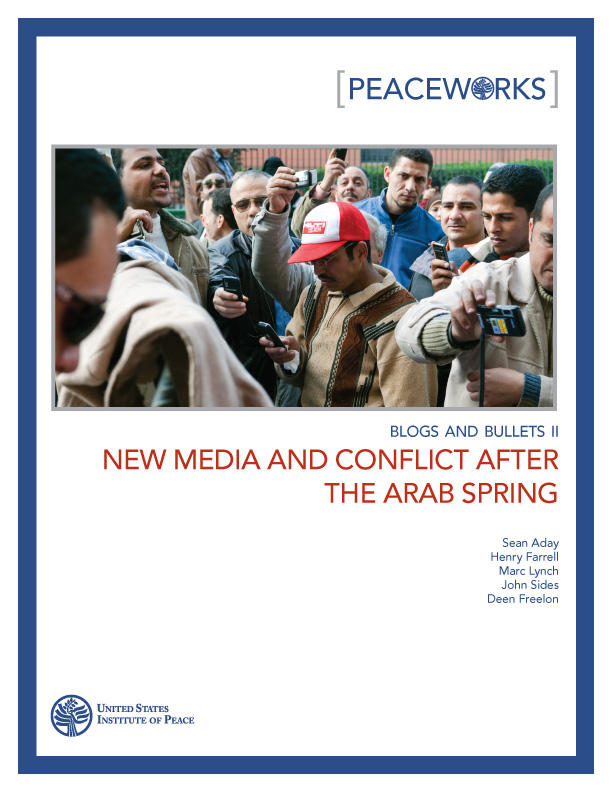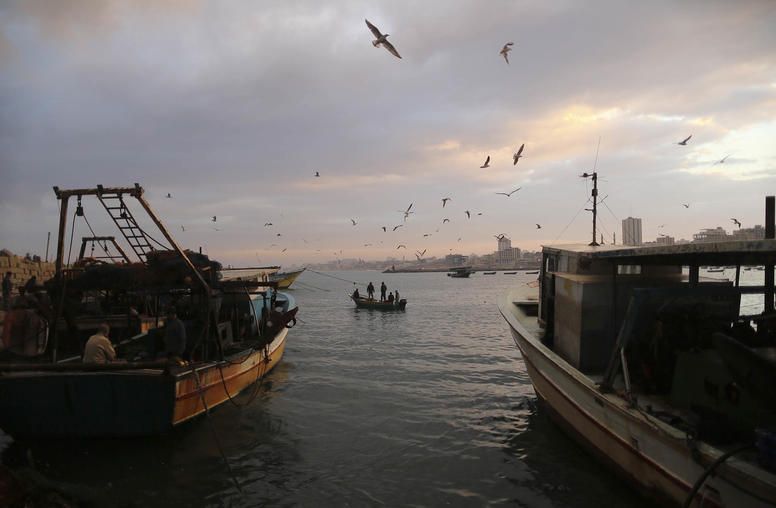Blogs and Bullets II: New Media and Conflict after the Arab Spring
Based on Twitter and Facebook data gathered during the 2011 Arab revolutions, the authors of this Peaceworks report find that new media informed international audiences and mainstream media reporting, but they find less evidence that it played a direct role in organizing protests or allowing local audiences to share self-generated news directly with one another.

Summary
- An extraordinary wave of popular protest swept the Arab world in 2011. Massive popular mobilization brought down long-ruling leaders in Tunisia and Egypt, helped spark bloody struggles in Bahrain, Libya, Syria, and Yemen, and fundamentally reshaped the nature of politics in the region.
- New media—at least that which uses bit.ly linkages—did not appear to play a significant role in either in-country collective action or regional diffusion during this period.
- This lack of impact does not mean that social media—or digital media generally—were unimportant. Nor does it preclude the possibility that other new media technologies were significant in these contexts, or even that different Twitter or link data would show different results. But it does mean that at least in terms of media that use bit.ly links (especially Twitter), data do not provide strong support for claims of significant new media impact on Arab Spring political protests.
- New media outlets that use bit.ly are more likely to spread information outside the region than inside it, acting like a megaphone more than a rallying cry. This dissemination could be significant if it led to a boomerang effect that brought international pressure to bear on autocratic regimes, or helped reduce a regime’s tendency to crack down violently on protests.
- It is increasingly difficult to separate new media from old media. In the Arab Spring, the two reinforced each other. New media must be understood as part of a wider information arena in which new and old media form complex interrelationships.
- Of the four major Arab Spring protests analyzed—Tunisia, Egypt, Libya, and Bahrain— large differences were found across the four in the amount of information consumed via social media. The events in Egypt and in Libya (#jan25 and #feb17, respectively) garnered many more clicks on a much larger number of URLs than those in Tunisia and Bahrain.
- The protests in Egypt and Libya attracted more attention than those in other countries and also focused that attention on a more delimited set of content. Particular hashtags, such as #jan25, received a disproportionate proportion of attention.
- The trends also suggest very sharp peaks of attention pegged to dramatic events, such as the departure of Ben Ali in Tunisia, the Pearl Roundabout raid in Bahrain, and several key days during the protest in Egypt—especially the “Friday of departure,” when Mubarak resigned.
About the Report
In this report from the United States Institute of Peace’s Centers of Innovation for Science, Technology, and Peacebuilding, and Media, Conflict, and Peacebuilding, a team of scholars from George Washington University and American University analyze the role of social media in the Arab Spring protests of 2011–12. It builds on a previous report, published in 2010 by USIP Press, titled Blogs and Bullets: New Media in Contentious Politics, and applies its five-level framework for studying and understanding the role of new media in political movements. The authors utilize a unique dataset from bit.ly, the URL shortener commonly associated with Twitter and used by other digital media such as Facebook. With these data, the authors are able to test empirically the claims of “cyberoptimists” and “cyberskeptics” about the role of new media in bringing down autocratic regimes in Tunisia, Egypt, and Libya and in spurring protests in other parts of the Arab World, such as Bahrain.
About the Authors
Sean Aday is an associate professor of media and public affairs and international affairs at George Washington University and director of the Institute for Public Diplomacy and Global Communication. Henry Farrell is an associate professor of political science at George Washington University. Marc Lynch is an associate professor of political science and international affairs at George Washington University and director of the Institute for Middle East Studies. John Sides is an associate professor of political science at George Washington University. Deen Freelon is an assistant professor of communication at American University.



